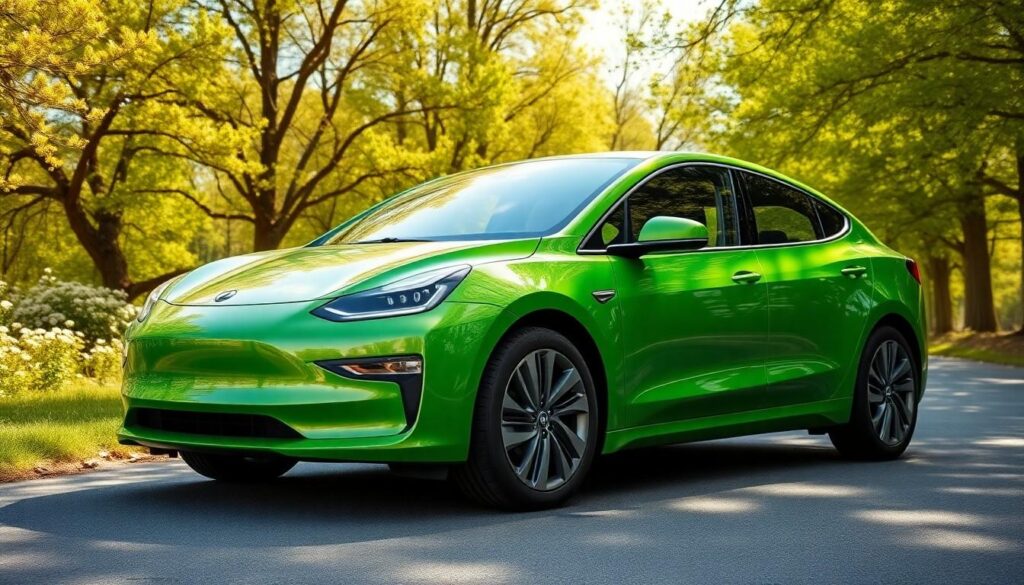Looking for the perfect name for your eco-friendly vehicle? We’ve compiled an extensive list of green car names that highlight your commitment to sustainability while adding personality to your ride.
In today’s environmentally conscious industry, driving a green vehicle isn’t just about reducing your carbon footprint—it’s a statement about your values. Whether you’ve purchased an electric, hybrid, or fuel-efficient car, giving it an earth-friendly name celebrates your contribution to a cleaner planet. From playful puns like “Volt-aire” and “Leaf Me Alone” to nature-inspired names such as “Evergreen” or “Zephyr,” the right name can make your sustainable choice even more meaningful.
10 Eco-Friendly Green Car Names That Reflect Environmental Consciousness
- Evergreen – This name perfectly captures the enduring commitment to sustainability that comes with owning an eco-friendly vehicle. Your car becomes a symbol of perpetual environmental consciousness, much like evergreen trees that remain verdant throughout seasons.
- Terra – Derived from the Latin word for Earth, Terra connects your vehicle directly to our planet. This name works wonderfully for electric SUVs or crossovers that help you explore nature while protecting it.
- Zephyr – Meaning a gentle breeze or wind, Zephyr reflects the minimal environmental impact and quiet operation of electric and hybrid vehicles. Your car moves through the industry as softly as a whispered wind.
- Solstice – Celebrating the power of the sun, this name is ideal for solar-powered or solar-assisted vehicles. It highlights the renewable energy aspect while giving your car a distinctive, memorable identity.
- Cascade – Reminiscent of pristine waterfalls and clean flowing water, Cascade evokes purity and natural energy. This name suits vehicles with sleek, flowing designs and water-inspired blue or green exteriors.
- Arbor – Honoring trees and their crucial role in our network, Arbor makes a strong statement about your environmental values. We’ve noticed this name resonates particularly well with owners of larger green vehicles used for family transportation.
- Aurora – Inspired by the magical northern lights, this name suggests transformation and ethereal beauty. Aurora works beautifully for vehicles with color-changing or iridescent paint options that reflect environmental elements.
- Gaia – Named after the ancient Greek goddess of Earth, Gaia represents the interconnectedness of all living things. Your eco-friendly vehicle becomes an extension of this planetary consciousness with this powerful name.
- Horizon – Symbolizing a cleaner future and new possibilities, Horizon captures the forward-thinking mindset of green vehicle owners. This name particularly suits cutting-edge models with innovative sustainable technologies.
- Oasis – Representing a refreshing exception to pollution-heavy transportation, Oasis positions your vehicle as a sanctuary of sustainability. The name invokes images of life-giving water in a desert of conventional fuel vehicles.
How Automakers Choose Green Names to Highlight Sustainability

Automakers employ strategic naming approaches for their eco-friendly vehicles to communicate environmental values and appeal to sustainability-conscious consumers. These names often fall into distinct categories that emphasize different aspects of green technology and environmental stewardship.
Nature-Inspired Naming Strategies
Nature-inspired names create an immediate connection between vehicles and environmental harmony. Manufacturers frequently use natural elements in their naming conventions, with terms like “Air,” “Water,” and “Earth” suggesting environmental balance. The Nissan Leaf perfectly exemplifies this approach with its direct reference to plant life. Automakers also incorporate exact plant and tree names such as “Olive,” “Willow,” and “Cypress” to evoke particular shades of green and natural imagery. These botanical references resonate with environmentally aware customers looking for vehicles that reflect their values. Some brands take a more playful approach by naming their green vehicles after insects and small creatures, with names like “Grasshopper” and “Little Sprout” adding an endearing quality to their eco-friendly offerings.
Technology-Focused Green Branding
Technology-focused names highlight the advanced engineering behind sustainable vehicles. Many automakers directly reference the innovative powertrains in their naming strategies, using terms like “Electric Avenue” or “Hybrid Power” to emphasize cutting-edge technology. Performance-oriented terminology such as “Efficient Motion” and “Kinetic Flow” underscores the optimized efficiency that attracts many green car buyers. Innovative terminology including “Solar,” “Bio,” and “Terra” helps brands position their vehicles at the intersection of environmental consciousness and technological progress. These tech-forward names appeal particularly to consumers who value innovation alongside sustainability, showcasing how modern engineering answers can address environmental challenges through automotive design.
Top Electric Vehicles With Earth-Friendly Names

The automotive industry has embraced environmental consciousness through thoughtful naming strategies for their eco-friendly vehicles. These names often reflect the sustainable values and green technology that define these innovative cars.
Toyota Prius: The Pioneer of Green Naming
Toyota’s Prius stands as a groundbreaking model in the industry of environmentally conscious vehicles. The name “Prius” comes from Latin, meaning “before” or “first,” perfectly capturing its pioneering status in hybrid technology. Since its introduction, this vehicle has become synonymous with fuel efficiency and reduced emissions. Toyota brilliantly chose a name that subtly communicates the car’s innovative position without explicitly using environmental terminology, yet the Prius brand has become inherently associated with green transportation and sustainability initiatives worldwide.
Nissan Leaf: Direct Environmental Messaging
Nissan took a more straightforward approach with the naming of their fully electric vehicle. The Leaf name directly conveys environmental messaging through its clear nature symbolism. This name choice brilliantly symbolizes growth, renewal, and natural harmony—all core values of environmental stewardship. By selecting such an overt nature reference, Nissan establishes an immediate connection between their vehicle and environmental consciousness. The simplicity of the name “Leaf” makes it instantly recognizable and memorable while reinforcing the zero-emission benefits this popular electric vehicle offers consumers.
Tesla Models: Subtle Green Branding
Tesla employs a different naming convention for their electric vehicles, opting for alphanumeric designations rather than explicit nature references. Models like the S, 3, and Y don’t directly evoke environmental themes through their names. But, the Tesla brand itself has become powerfully synonymous with sustainable transportation and cutting-edge electric technology. This approach demonstrates how a strong brand identity can communicate environmental values even without explicitly green model names. Tesla’s reputation for innovation and sustainability permeates all their vehicles, making each model inherently associated with environmental progress regardless of its exact designation.
Hybrid Vehicles With Green-Themed Names

Manufacturers carefully select names for their hybrid vehicles that communicate both environmental benefits and key brand values. These thoughtfully chosen names help establish connections with eco-conscious consumers while highlighting the unique selling points of each model.
Honda Insight: Intelligence Meets Efficiency
Honda’s naming strategy for the Insight brilliantly captures the essence of this pioneering hybrid vehicle. The name “Insight” reflects the intelligent engineering and innovative approach behind this fuel-efficient car. This thoughtful designation suggests a deep understanding of hybrid technology, positioning the vehicle as a smart choice for environmentally conscious drivers. Honda’s branding emphasizes both the vehicle’s advanced technological features and its ability to provide drivers with greater awareness about their environmental impact through efficient performance.
Ford Escape Hybrid: Freedom With Responsibility
Ford expertly balances seemingly opposing concepts with the Escape Hybrid name. “Escape” evokes a sense of liberation and adventure, appealing to drivers who crave freedom on the road. The “Hybrid” qualifier immediately signals the vehicle’s eco-friendly credentials, creating a powerful combination that resonates with environmentally responsible consumers. This naming approach effectively communicates that drivers can enjoy the thrill of exploration without compromising their commitment to sustainability. Ford’s strategy demonstrates how green vehicles can maintain exciting brand attributes while embracing environmental values.
Upcoming Green Car Names in the EV Revolution

The electric vehicle revolution is bringing a wave of exciting new models with names that reflect innovation, sustainability, and brand identity. Several highly anticipated EVs are set to hit the market in the coming years, each with distinctive naming approaches that tell us something about their positioning and target audience.
- Cadillac Vistiq: This three-row electric SUV from Cadillac is scheduled for an early 2025 launch, continuing the brand’s “-iq” naming convention for its electric lineup.
- Chevrolet Corvette EV: The iconic Corvette is going electric, with plans not only for a fully electric version of the classic sports car but also potential new Corvette-branded vehicles including a four-door “coupe” and a performance crossover.
- Kia EV4: Expected to arrive in early 2026, this compact electric sedan continues Kia’s straightforward EV naming strategy with a clear numerical designation.
- Lucid Gravity: This electric SUV from luxury EV maker Lucid focuses on exceptional performance and range, with a name suggesting power and physical presence.
- Acura RSX: Scheduled for an early 2026 release, this electric vehicle resurrects a familiar Acura nameplate for the electric era.
- Alfa Romeo Giulia EV and Stelvio EV: These electric versions of Alfa’s popular models maintain brand heritage while adding the EV designation, with expected releases in 2026 and 2027.
Next-Generation Naming Trends
Automakers are employing innovative naming strategies to highlight the technological features and environmental benefits of their newest electric vehicles. We’re seeing clear patterns emerge as brands seek to position their EVs effectively:
- EV and “e” Prefixes/Suffixes: Many manufacturers directly incorporate “EV” or “e” into vehicle names, making the electric powertrain immediately identifiable to consumers. This straightforward approach helps buyers quickly recognize electric options in a brand’s lineup.
- Performance Indicators: High-performance electric variants often receive special designations, such as the “600E4” badge planned for certain Cadillac Vistiq models, communicating power output and electric all-wheel drive capability.
- Heritage Integration: Established automakers frequently leverage familiar nameplates for their electric offerings, maintaining brand continuity while transitioning to new technology. The Chevrolet Corvette EV exemplifies this approach, building on decades of performance heritage.
- Future-Forward Terminology: Some brands opt for names that evoke progress, innovation, and the future, positioning their vehicles as cutting-edge technological achievements rather than simply electrically-powered alternatives.
Global Differences in Green Car Naming
Car manufacturers around the industry take distinctly different approaches to naming their green vehicles based on regional preferences, market positioning, and cultural considerations:
- European Brands: European automakers like Alfa Romeo tend to respect tradition while acknowledging evolution. Their approach typically retains established model names like “Giulia” while adding “EV” designations, balancing heritage with technological progress.
- Asian Manufacturers: Companies such as Kia and Hyundai generally favor more technical and straightforward naming conventions. Their strategy often includes clear alphanumeric systems that precisely identify both the vehicle category and its electric nature, as seen with the Kia EV4.
- American Automakers: US brands including Cadillac and Chevrolet typically blend luxury positioning with performance heritage in their naming approaches. They’re creating distinctive naming families for their electric vehicles that communicate premium status and technological advancement.
- Regional Market Adaptations: Some manufacturers adjust vehicle names across different global markets to better resonate with local consumers, accounting for language differences, cultural associations, and varying attitudes toward electric mobility.
How Green Car Names Influence Consumer Perception and Sales

Environmental Themes Create Strong Consumer Resonance
Names that emphasize environmental themes significantly impact how consumers perceive green vehicles. Car names incorporating terms like “Eco,” “Green,” “Terra,” or “Bio” directly communicate environmental consciousness and sustainability values. Vehicles with names such as “EcoDrive,” “GreenPower,” and “Terra Explorer” create an immediate association with eco-friendliness in consumers’ minds. This naming strategy strengthens the perceived alignment between the vehicle’s purpose and its environmental benefits, making the car more appealing to sustainability-focused buyers.
Sustainability References Drive Purchase Intent
Car names highlighting renewable energy or efficiency concepts reinforce the vehicle’s reduced environmental footprint. Names featuring words like “Solar,” “Electric,” “Efficient,” or “Kinetic” connect performance capabilities with environmental advantages. “Solar Flare,” “Electric Avenue,” and “Efficient Motion” help consumers quickly identify vehicles as eco-friendly options. Research shows that these sustainability-focused names resonate particularly well with highly educated consumers who understand the relevance of green vehicles in our transportation future.
Natural Element Names Create Emotional Connections
Names referencing natural elements like “Air,” “Water,” “Earth,” or “Leaf” evoke a powerful connection with nature. These names suggest minimal environmental impact and harmony with natural ecosystems. Vehicles named “Air Stream,” “Water Lily,” or “Earth Rover” help consumers associate the car with environmental protection and respect for natural resources. This naming approach taps into consumers’ emotional connection to the natural industry, making the vehicle feel like a choice aligned with their values.
Conservation-Themed Names Signal Corporate Commitment
Names alluding to conservation efforts, such as “Preserve,” “Renew,” “Sustain,” or “Protect,” emphasize a commitment to environmental protection. These names directly connect vehicles with broader environmental initiatives that consumers care about. “Preserve Green,” “Renew Energy,” and “Sustain Mobility” signal to potential buyers that the manufacturer shares their environmental concerns. This alignment between consumer values and brand messaging can significantly influence purchasing decisions.
Positive Perception Translates to Sales Growth
Research indicates that thoughtfully named green cars generate more positive consumer perceptions. A study examining consumer attitudes in India found that environmentally themed names can enhance sales among environmentally conscious consumers. Green behavior and perceived benefits positively influence purchasing decisions, with environmental awareness acting as a moderating factor. Names that clearly convey environmental benefits effectively target the growing segment of eco-conscious consumers, eventually driving sales of green vehicles.
Conclusion: The Future of Green Naming in the Automotive Industry
Naming green vehicles is more than just a fun exercise—it’s becoming an essential part of automotive marketing strategy. As we’ve seen throughout this guide, thoughtfully chosen names can forge emotional connections with eco-conscious buyers and effectively communicate a car’s sustainable values.
The automotive industry continues to evolve its naming conventions as electric and hybrid vehicles become mainstream. We expect to see more creative naming approaches that blend environmental themes with technological innovation in the coming years.
Whether you choose a nature-inspired name for your personal vehicle or track how manufacturers develop their green branding, these names represent our collective shift toward more sustainable transportation. The perfect green car name captures not just a vehicle’s identity but our shared hope for a cleaner automotive future.
Frequently Asked Questions
Why is naming an eco-friendly vehicle important?
Naming your eco-friendly vehicle creates a personal connection and celebrates your commitment to sustainability. A thoughtful name reflects your environmental values and enhances your emotional bond with the vehicle, making your green transportation choice feel more meaningful and aligned with your identity as an environmentally conscious consumer.
What are some popular nature-inspired names for green vehicles?
Popular nature-inspired names include Evergreen, Terra, Zephyr, Solstice, Cascade, Arbor, Aurora, Gaia, Horizon, and Oasis. These names connect vehicles to environmental themes like forests, earth, wind, seasons, water, trees, natural light, the planet, future vision, and natural havens—all reinforcing the owner’s commitment to sustainability.
How do car manufacturers name their eco-friendly vehicles?
Manufacturers typically use two main naming strategies: nature-inspired names (referencing elements like leaves, earth, or sky) and technology-focused names (highlighting innovation or efficiency). These names communicate environmental values and appeal directly to sustainability-conscious consumers, helping brands position their green vehicles in the competitive market.
What are some examples of successful eco-friendly car names from major manufacturers?
Successful examples include the Toyota Prius (meaning “to go before” in Latin), Nissan Leaf (directly referencing nature), and Tesla’s models with their simple alphanumeric naming system. These names have become synonymous with eco-friendly transportation and have helped establish these vehicles as icons in the green automotive space.
What naming trends are emerging for new electric vehicles?
Emerging trends include using “EV” or “e” prefixes to signal electric power, incorporating performance indicators that highlight capability, and integrating heritage elements from brand history. Manufacturers are also adapting naming strategies to reflect regional preferences and cultural considerations, creating names that resonate globally while maintaining brand identity.
How do green car names influence consumer perception and sales?
Names with environmental themes significantly impact how consumers view green vehicles. Research shows that names incorporating terms like “Eco,” “Green,” and references to natural elements create stronger sustainability associations and foster emotional connections with consumers. Well-named green cars generate positive perceptions and drive sales growth among eco-conscious buyers.
Should I choose a playful or serious name for my eco-friendly vehicle?
This depends on your personality and how you view your vehicle. Playful pun names like “Volt Whitman” or “Watt’s Up” add fun to your eco-choice, while more serious names like “Guardian” or “Steward” emphasize environmental responsibility. Choose what resonates with your personal style and the statement you want to make with your vehicle.
How are hybrid vehicle names different from fully electric vehicle names?
Hybrid names often blend concepts of technology and nature (like Toyota Prius), whereas fully electric vehicle names tend to emphasize either cutting-edge innovation (Tesla Model 3) or pure environmental themes (Nissan Leaf). Hybrids’ dual-system technology is often reflected in names that bridge traditional automotive naming with new green terminology.







